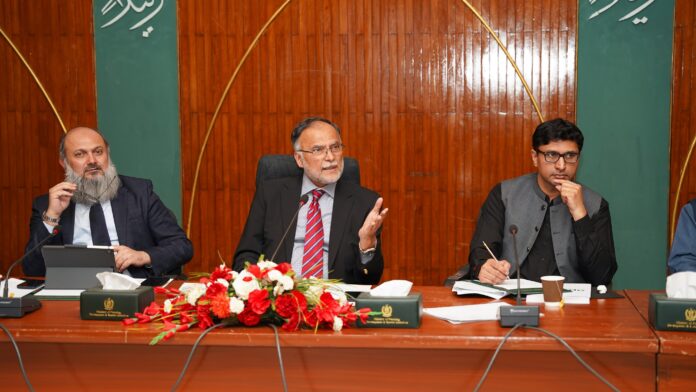ISLAMABAD, Apr 07 (APP): Minister for Planning, Development and Special Initiatives Professor Ahsan Iqbal on Monday stressed the need for upgrading country’s textile industry, enabling it to compete with global brands.
“Value addition in textile industry is necessary for the uplift of textile sector. Pakistani businesses currently lack competitive value chains that play a crucial role in introducing local products to the global markets,” he said.
The minister expressed these remarks while chairing the third meeting of the committee formed by the Prime Minister to review the Export Facilitation Scheme (EFS), along with Federal Minister for Commerce, Jam Kamal Khan, a news release said.
The meeting was attended by senior officials from Ministry of Commerce, Federal Board of Revenue (FBR) and representatives from other relevant ministries.
More than 60 representatives from the business community including leading textile companies participated via video link in a detailed consultative session with government officials.
The minister emphasized that Prime Minister’s directive for export facilitation was aimed at providing a comprehensive framework to support investors and enhance Pakistan’s export potential.
He reiterated the government’s commitment to creating a business-friendly environment in line with its export strategy, urging the business community to align with evolving global trends.
He underscored the importance of achieving the ambitious target of $60 billion in exports by 2029, stating that Pakistan’s economic future depends on rapid and sustainable export growth.
The minister stressed upon the fact that garments and apparel industry was the future of Pakistan’s export economy and facilitating exporters to achieve ambitious targets was the government’s foremost priority.
He stated that Uraan Pakistan prioritized eight areas for export growth including agriculture, industries, services, IT, mining, manpower, blue economy and creative industries.
“Both government and private sector must work as a team to harness Pakistan’s true export potential,” the minister said.
Highlighting the government’s Uraan Pakistan Agenda, the minister stated that the export sector held the key for national economic stability, security, and sovereignty. “Uraan Pakistan plan identifies exports as the number one priority because a sustainable export led economy is directly linked to the nation’s sovereignty,” stressed the minister.
Moreover, he called for exponential growth in exports, in view of our external sector demands, urging businesses to adopt a cluster based approach.
“Countries with the most competitive export industries have made it possible through cluster based development. In Pakistan, there is a necessary imperative to identify clusters of exportable products whose value-chains must be completed,” emphasized the federal minister.
Quoting the example of countries such as Singapore, China, Malaysia, Vietnam and Japan, the minister reiterated that Pakistani products too have strong potential to become globally recognized, if only they set high standards in productivity, quality and innovation.
During the meeting, the industrialists shared the problems faced by their businesses, related to tax discrimination, and the federal minister assured them that government will remove all hurdles in the way of export enhancement and will adopt all measures to ensure Pakistan’s presence in international trade.

